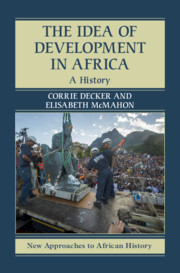Book contents
- The Idea of Development in Africa
- New Approaches to African History
- The Idea of Development in Africa
- Copyright page
- Contents
- Figures
- Tables
- Maps
- Boxes
- Acknowledgments
- Maps
- Introduction
- Part I Origins of the Development Episteme
- Part II Implementation of the Development Episteme
- Chapter 5 The Salvation of Science
- Chapter 6 Challenges to Development
- Chapter 7 From Modernization to Structural Adjustment
- Chapter 8 The New Missionaries
- Part III “Problems” in the Development Episteme
- Epilogue
- Bibliography
- Index
- References
Chapter 7 - From Modernization to Structural Adjustment
from Part II - Implementation of the Development Episteme
Published online by Cambridge University Press: 16 October 2020
- The Idea of Development in Africa
- New Approaches to African History
- The Idea of Development in Africa
- Copyright page
- Contents
- Figures
- Tables
- Maps
- Boxes
- Acknowledgments
- Maps
- Introduction
- Part I Origins of the Development Episteme
- Part II Implementation of the Development Episteme
- Chapter 5 The Salvation of Science
- Chapter 6 Challenges to Development
- Chapter 7 From Modernization to Structural Adjustment
- Chapter 8 The New Missionaries
- Part III “Problems” in the Development Episteme
- Epilogue
- Bibliography
- Index
- References
Summary
This chapter traces the shift in African development policies from the era of modernization in the 1950s to the emergence of Structural Adjustment Policies (SAPs) in the late twentieth century. As colonialism waned and African nation-states came into existence, international organizations and foreign governments replaced imperial powers as the primary investors in African development. The United Nations, the International Monetary Fund (IMF), and the World Bank were at the forefront of this movement. African nationalists and the leaders of newly independent countries forged permanent ties to international development agencies and wealthy donor nations such as the United States and the Soviet Union, the post–World War II superpowers hoping to convince African rulers to support their side of the Cold War. The internationalization of African development expanded during the 1980s when the now widely criticized SAPs of the IMF and the World Bank eroded both state power and state-sponsored social services in African countries. Rising political leaders who made big promises to their constituents in the era of independence during the 1960s found their hands tied by the internationalization of development and Cold War politics over the next two decades. Some, however, managed to play these politics to their advantage.
Keywords
- Type
- Chapter
- Information
- The Idea of Development in AfricaA History, pp. 143 - 163Publisher: Cambridge University PressPrint publication year: 2020

